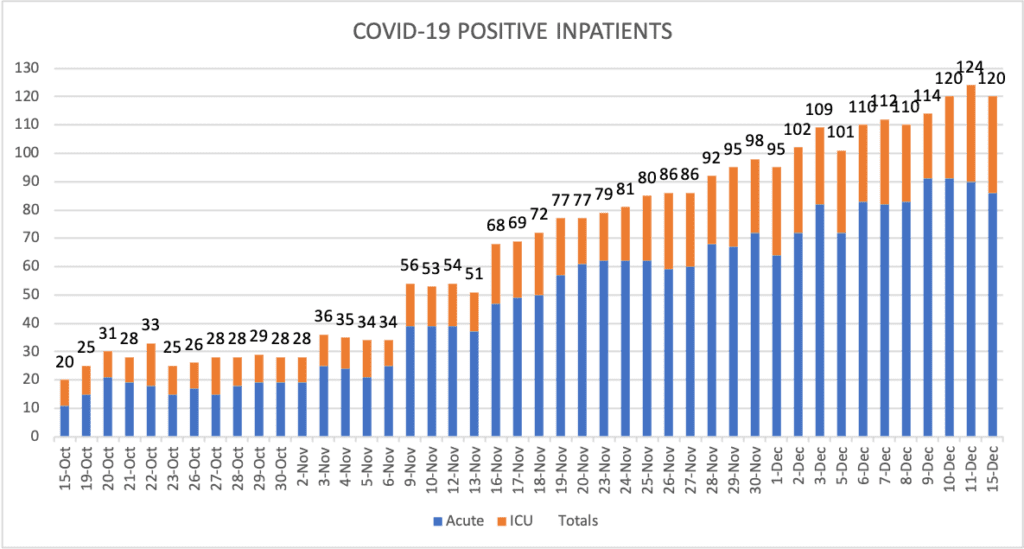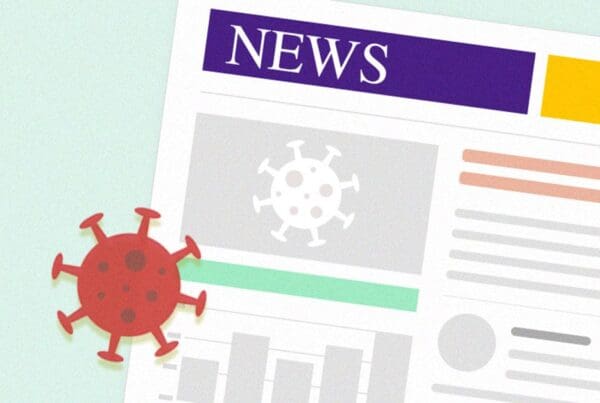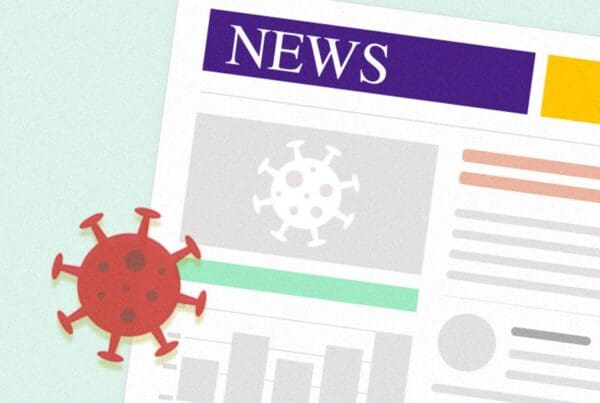Data Snapshot
UW Medicine Hospitals:

King County: The county reported 632 new positive cases and 0 new deaths on Dec. 14.
Washington: The state reported 203,797 cases and 2,918 deaths as of Dec. 13.
United States: The CDC reports 16,317,892 cases and 300,032 deaths as of Dec. 15.
Global: WHO reports 71,581,532 confirmed COVID-19 cases and 1,618,374 deaths as of Dec. 15.
Numbers update frequently, please follow links for most up-to-date numbers.
COVID-19 Literature Reports
COVID-19 Literature Situation Report is a daily (M-F) newsletter put together by the Alliance for Pandemic Preparedness that provides a succinct summary of the latest scientific literature related to the COVID-19 pandemic.
Key Takeaways: COVID-19 Literature Situation Report Dec. 11, 2020
- School-based mitigation strategies recommended by CDC would cost an estimated 0.3% to 7.1% more than school expenditures reported by states in fiscal year 2018. More.
- Analysis of 772 complete SARS-CoV-2 genomes from early in the Boston area epidemic revealed numerous introductions of the virus, including two superspreading events, one of which was a business conference that is linked to as many as 300,000 subsequent infections. More.
- A meta-analysis finds that the overall proportion of HCWs that intend to accept COVID-19 vaccination was 56%, with a range across surveys done in 8 countries from 28% to 82%. More
- Patients with a recent diagnosis of cancer were at significantly increased risk for COVID-19 infection and its adverse outcomes in an analysis of more than 70 million US patient records. More.
COVID-19 Literature Surveillance Team, is an affiliated group of medical students, PhDs and physicians keeping up with the latest research on SARS-CoV-2 / COVID-19 by finding the newest articles, reading them, grading their level of evidence and bringing you the bottom line.
- Read the latest report: Dec. 11 | Daily COVID-19 LST Report.
- Listen to the latest podcast: Dec. 11 | COVID-19 LST Podcast.
UW Medicine in the News
The Seattle Times: First coronavirus vaccines arrive at UW Medical Center in Seattle
Featuring: Steve Fijalka, Christine Meyer, Pharmacy, UWMC
“FedEx dropped off 3,900 doses of Pfizer’s coronavirus vaccine — some of the first delivered in the state — ‘a little earlier than anticipated’ at 7:20 a.m., said Steve Fijalka, UW Medicine’s chief pharmacy officer. They’ve been preparing for this moment for months, but it didn’t feel real until the box was in his hands. ‘Special,’ he said. ‘Now, comes the fun part: getting it into the arms of staff.’ The vaccine delivery, among the first in Washington state, is the local launch of a historic national effort to vaccinate as many of the country’s 330 million people as are willing to bare their arms. It could represent the turning point against the virus that has killed nearly 3,000 Washingtonians, hobbled the state’s economy and disrupted nearly every aspect of society. UW Medicine plans to ‘soft-launch’ vaccination clinics Tuesday, Fijalka said. Staffers at highest risk were encouraged last weekend to sign up for vaccination beginning this Thursday, when clinics officially open.”
Crosscut: The pandemic will forever change how doctors define ‘crisis’
Featuring: Kate Butler, Nephrology
“While hospitals never declared an official crisis or activated their triage teams this spring to introduce explicit rationing and crisis care guidance, new research from University of Washington School of Medicine clinicians shows that some could have. Through interviews with 61 clinicians across the U.S. between April 9 and May 26, researchers asked about how hospitals planned for a crisis, how that planning bore out in practice and what further complications were there to providing the best possible care in the pandemic. The team discovered that in the murky period of pandemic resource scarcity that didn’t officially qualify as a “crisis,” doctors they were already basically rationing and doing so without clear bioethical guidance — all of which created considerable emotional and ethical stress in clinicians that also impacted patient care. We sat down with Dr. Kate Butler, corresponding author of the study and an acting instructor at the University of Washington School of Medicine’s division of nephrology, to talk about how the way we conceive of crises complicates attending to them, and what doctors need to better support each other and their patients in pandemic scenarios.”
KIRO 7: As the first COVID-19 vaccine arrives, rampant rumors and myths spread online
Featuring: Ali Mokdad, IHME, Deborah Fuller, Microbiology
“Washington will get the first shipments of Pfizer and BioNTech’s vaccine on Monday, and an even larger initial batch of Moderna’s vaccine to reach the state as early as next week. But about 40% of Americans say they’re unwilling to take the vaccine. The debunked rumors range from claims that a COVID vaccine will microchip and track you, to false claims that the vaccine can alter your DNA. Doctors at UW Medicine say all of the misinformation is a big problem because trust in the vaccine is critical – 70% to 90% of the population needs to be vaccinated to achieve herd immunity and stop the spread of the virus. ‘The anti-vaccine movement is the most serious one. Right now they have a platform to spread the rumors,’ said Dr. Ali Mokdad, a scientist with the Institute for Health Metrics and Evaluation (IHME).”
Tweet of the Week
A turning point in the fight against COVID-19: @UWMedicine is administering its first vaccines to frontline workers https://t.co/h0enO3u7A8
— UW Medicine Newsroom (@uwmnewsroom) December 15, 2020

